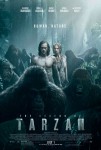We just got back from the new Legend of Tarzan. It was a mistake to go. It was a mistake to make this movie. Please, Hollywood, next time someone proposes to make a Tarzan movie, haul out the original source books and slap someone with them hard. You simply can not make a movie from them anymore.
I say this as someone who grew up on the Tarzan novels — my father had first edition hardcover copies of these things (which, as a child, I ruined by scrawling all over them in crayon), and I read them and enjoyed them. It was only as I got old enough to actually think about the content that I became uncomfortable.
They are irredeemably racist. They are built on a foundation of racist theories, and they openly revel in racist stereotypes. I could find them entertaining as an oblivious white kid, but once you grow up, you have to wake up to the context. And the context is intolerable.
Consider the stories. “Tarzan” is a word in Edgar Rice Burroughs’ fictitious ape language that means…”white skin”. The apes in the story knew of humans, but only black humans — and being white was the singular remarkable feature of the foundling child who was raised by the apes. This whiteness — and the fact that he was the child of an English lord — bestowed upon him remarkable physical and mental abilities, so that he was able to teach himself both French and English from primers that his deceased parents had rescued from the shipwreck that stranded them on the savage coast of Africa.
Note that Tarzan’s parents died almost immediately after he was born, so he had no knowledge of language or writing, but could bootstrap himself into literacy from moldering books in his parents’ cabin. I know, it’s a fantasy story, but this is a genuinely superhuman feat by a baby who was being fed on grubs and fruit by a family of apes.
A frequently ignored element of the books is the nearby African village, which is inhabited by classic stereotypes. The black people living there are cruel, superstitious, and stupid; many of the early stories are about how Tarzan gleefully torments and steals from the village, which he’s able to do because, well, he’s a white man, and they’re mere simple-minded negroes. This is treated as entirely natural and appropriate for an English lord to do. This feature is not in this current movie, but take a look at the portrayal of Africans in the old movies. You should cringe.
There are odious assumptions galore here. Burroughs wasn’t particularly original in his best-selling novel — the story used implicit prejudices common in Western culture at the time. For instance, take a look at the swamping argument of Fleeming Jenkin against evolution — doesn’t this sound very familiar?
Suppose a white man to have been wrecked on an island inhabited by negroes, and to have established himself in friendly relations with a powerful tribe, whose customs he has learnt. Suppose him to possess the physical strength, energy, and ability of a dominant white race, and let the food and climate of the island suit his constitution; grant him every advantage which we can conceive a white to possess over the native; concede that in the struggle for existence his chance of a long life will be much superior to that of the native chiefs; yet from all these admissions, there does not follow the conclusion that, after a limited or unlimited number of generations, the inhabitants of the island will be white. Our shipwrecked hero would probably become king; he would kill a great many blacks in the struggle for existence; he would have a great many wives and children, while many of his subjects would live and die as bachelors; an insurance company would accept his life at perhaps one-tenth of the premium which they would exact from the most favoured of the negroes. Our white’s qualities would certainly tend very much to preserve him to good old age, and yet he would not suffice in any number of generations to turn his subjects’ descendants white. It may be said that the white colour is not the cause of the superiority. True, but it may be used simply to bring before the senses the way in which qualities belonging to one individual in a large number must be gradually obliterated. In the first generation there will be some dozens of intelligent young mulattoes, much superior in average intelligence to the negroes. We might expect the throne for some generations to be occupied by a more or less yellow king; but can any one believe that the whole island will gradually acquire a white, or even a yellow population, or that the islanders would acquire the energy, courage, ingenuity, patience, self-control, endurance, in virtue of which qualities our hero killed so many of their ancestors, and begot so many children; those qualities, in fact, which the struggle for existence would select, if it could select anything?
Everyone took for granted the natural “physical strength, energy, and ability of a dominant white race”, and that it was only to be expected that “he would kill a great many blacks in the struggle for existence” and that he would rule over the inferior inhabitants of Africa. Burroughs took this presumption and combined it with a feral child story, and voila, Tarzan.
The new movie struggles to overcome the racist subtext of the story, but fails. It’s implicit. In this case, the writers have made some heroic black characters, and rather than robbing and tormenting the black tribes, White Skin has now arrived to save them from colonial marauders.
I shouldn’t have to spell out the problem with that.
Note also that — SPOILER ALERT, I’m about to tell you the end of the movie, but really, you should not care —



